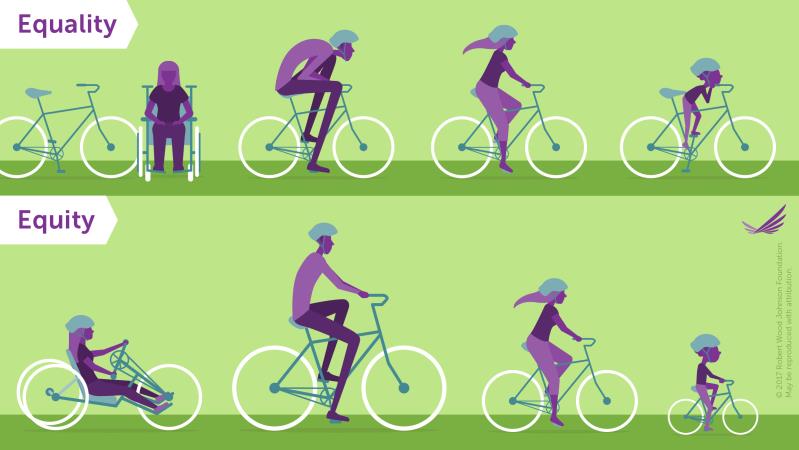November 9, 2023
What is Health Equity?

What is health equity? If you have difficulty answering that question, or the factors that influence health equity, you’re not alone. The 2018 National Survey of Health Attitudes found most Americans aren’t familiar with what health equity means, or the factors used to determine it. In fact, only 31% of the people surveyed strongly agreed that it would be unfair if some people had more of an opportunity to be healthy than other people.
The term “health equity” was first used in a 1966 journal article but didn’t gain traction until the 2000s. In 2018, there were over 6,000 articles published about health equity and its drivers, known as social determinants of health.
Health equity does not mean health equality
Health equity is about giving all people an opportunity to be healthy. “Pretty simply, health equity just means that every person has the opportunity to achieve optimal health regardless of things like the color of their skin, gender identity or sexual orientation,” explains Jen Groves, EveryStep vice president of community health services.
Health equity is not about “them”
But Groves says to truly understand health equity, you need to go deeper. “I think some of these factors are what people would
"I can’t imagine there is any Iowan that can look at the big picture and believe they are not impacted. So, this is not about “them”, this is “us” — this is everyone.”
expect when we talk about issues impacting the opportunity to be healthy, but there are areas that impact all of us. For instance, what neighborhood you live in, your level of education, age or if you have a disability. These are areas that impact every single one of us. I can’t imagine there is any Iowan that can look at the big picture and believe they are not impacted. So, this is not about “them”, this is “us” — this is everyone.”
Connect with EveryStep
Even so, some factors are statistically more likely to impact health equity and EveryStep works to address those. “We have some very specific strategies and educational opportunities for folks that are racially, ethnically and linguistically driven,” says Groves. For instance, EveryStep’s Black and Birthy prenatal class and Doula program were created in response to statistics that show Black women are 4 times more likely than white women to die in pregnancy or childbirth.
What EveryStep is doing about health equity
“Curriculum was written and program is facilitated by Black health care experts to specifically make sure that folks have not only the childbirth education and prenatal education they need, but also the opportunity to talk about what it means to be pregnant and birthing in a Black community, and what it means to advocate for yourself and to have people walking beside you to advocate for you, as well,” Groves says.
Learn About EveryStep's Work in the Community
She adds that health equity comes down to access. But there is always a choice.
Some people with easy access to health care may still choose not to go to the doctor. “In the same way, all our services are voluntary. We're giving them access to information that can help them have a healthier life and if it feels like a fit, we’re going to figure out how to make it work the best way that we can. We’re here as long or as little as our clients need us. As we're learning more and unpacking more, we're making the necessary pivots to try and make sure that we continue to provide equitable services to folks in our community.”
We all face hard times in life, but some people in our community are coping with more difficult circumstances. Unfamiliar challenges are even more difficult to navigate if you don’t have near family, speak English fluently, or have the financial resources to pay for services. EveryStep shows up when people need us most — no matter who they are or what circumstances they face. We are driven by a single purpose to care for people and connect them with support at every step of their journey.
Consider a Monthly Donation
Through EveryStep, you have an opportunity to extend your generosity and compassion beyond your friends, family and neighbors to the thousands of Iowans experiencing life’s most difficult moments. Your gift, even a small contribution, becomes another thread strengthening the community fabric that binds us together.